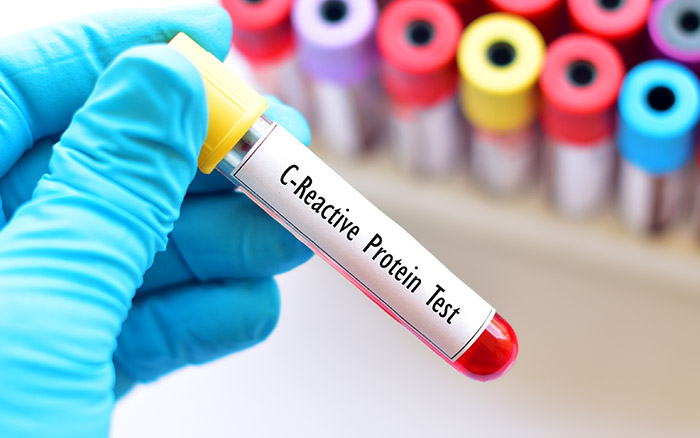- Home
- About Us
- Advanced Testing
- Nutrition & Self-Care
- Further Learning
- New Member Info
- Contact
C reactive protein is an acute phase inflammatory plasma protein made by the liver, so it will rise in conjunction with systemic inflammation from many different sources. For this reason, the “high sensitivity” CRP test is necessary for detecting low levels of CRP that correlate more with endothelial (vascular) inflammation.
In general, if “high sensitivity” CRP is between 1-5 then it is more likely a marker of CV risk, but if it is over 10 then the elevation could be from an acute infection, a recent injury, or another non-cardiac source like autoimmune disease.

The hs-CRP biomarker should decline with effective disease management, so it can also provide independent prognostic information after initiating treatment (to help assess how well a patient is responding to lifestyle changes and statin medication).
We cannot discuss hs-CRP without acknowledging the results of the Jupiter Trial. 1 In this trial, patients were recruited if they had low LDL-C values but elevations in hs-CRP. It was a double-blind, placebo-controlled, multi-center, event-driven, primary prevention trial of over 17,000 men and women . . . and it was stopped over two years early because of the tremendous efficacy that rosuvastatin (Crestor) showed in lowering CV events (even in “low-risk” patients). In this trial, patients with normal LDL cholesterol but positive inflammation (indicated by hs-CRP), had worsening atherosclerosis (as measured by CIMT). The only patients who experienced plaque regression were the ones who controlled both cholesterol and inflammation.
Many other well-designed studies have confirmed CV risk associated with elevations in CRP. The Women’s Health Study that included over 27,000 “apparently healthy” middle-aged women, showed that CRP was actually better than LDL cholesterol for predicting CV risk in women. 5 In addition, the Harvard-sponsored Physicians' Health Study of around 21,000 men demonstrated that CRP could predict heart disease before it was otherwise evident. 6 And in the AFCAPS/TexCAPS study (Air Force/Texas Coronary Atherosclerosis Prevention Study), individuals with below-median LDL and above-median CRP levels had a similar risk of future vascular events as those with overt hyperlipidemia. 4
So clearly the problem is not just cholesterol - vascular inflammation needs to be identified and treated in order to lower CV risk in patients.
In response to the convincing data from the JUPITER trial, the American Heart Association and the American College of Cardiology now recommend measuring CRP in men 50 years of age or older or women 60 years of age who have normal LDL cholesterol (< 130 mg/dL). Knowing this information can help clinicians determine which patients may still benefit from statin cholesterol medication. 3
Do something today for a better tomorrow!
Make an appointment now for advanced testing. We are here to help.
REFERENCES
1 – Ridker PM, Danielson E, Fonseca FA, et al. JUPITER Trial Study Group. Reduction in C-reactive protein and LDL cholesterol and cardiovascular event rates after initiation of rosuvastatin: a prospective study of the JUPITER trial. Lancet. 2009;373(9670):1175-1182.
2 – https://www.ncbi.nlm.nih.gov/pmc/articles/PMC2836530/
3 - https://www.ncbi.nlm.nih.gov/pmc/articles/PMC4394551/
4 - Ridker PM, Rifai N, Clearfield M, et al, for the Air Force/Texas Coronary Atherosclerosis Prevention Study Investigators. Measurement of C-reactive protein for the targeting of statin therapy in the primary prevention of acute coronary events. N Engl J Med. 2001; 344: 1959–1965.
5 - Ridker PM, Rifai N, Rose L, et al. Comparison of C-reactive protein and low-density lipoprotein cholesterol levels in the prediction of first cardiovascular events. N Engl J Med. 2002; 347: 1557–1565.
6 - https://www.ncbi.nlm.nih.gov/pubmed/9610529